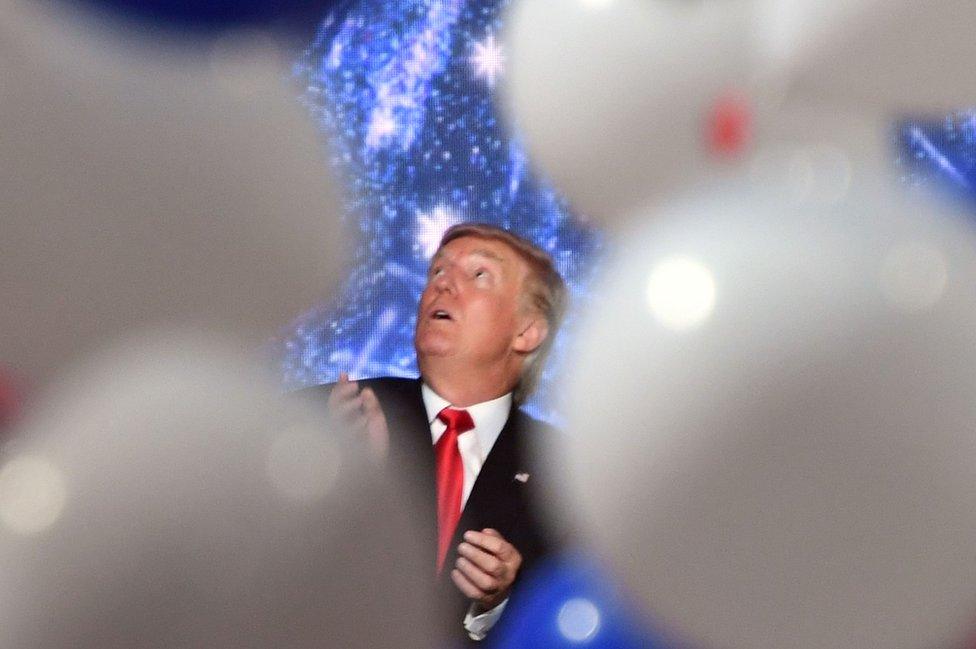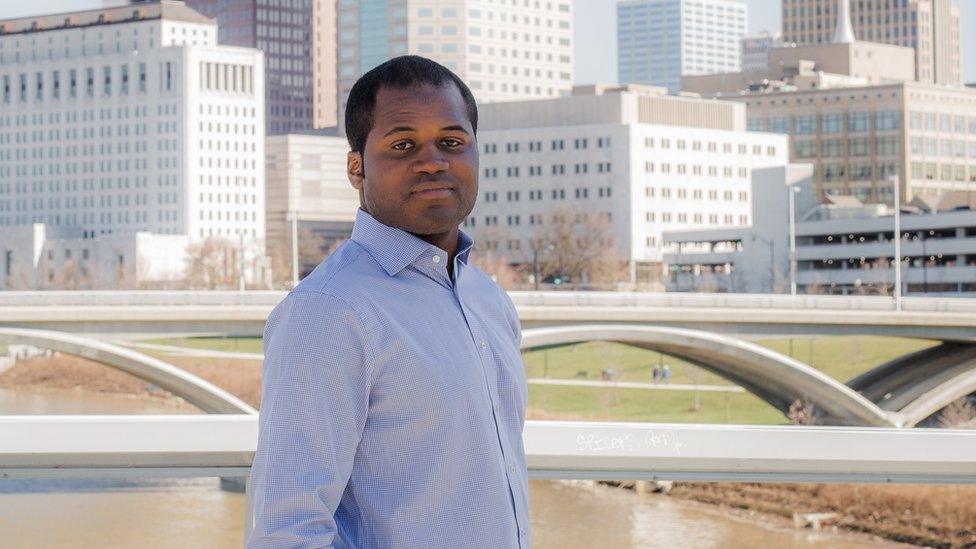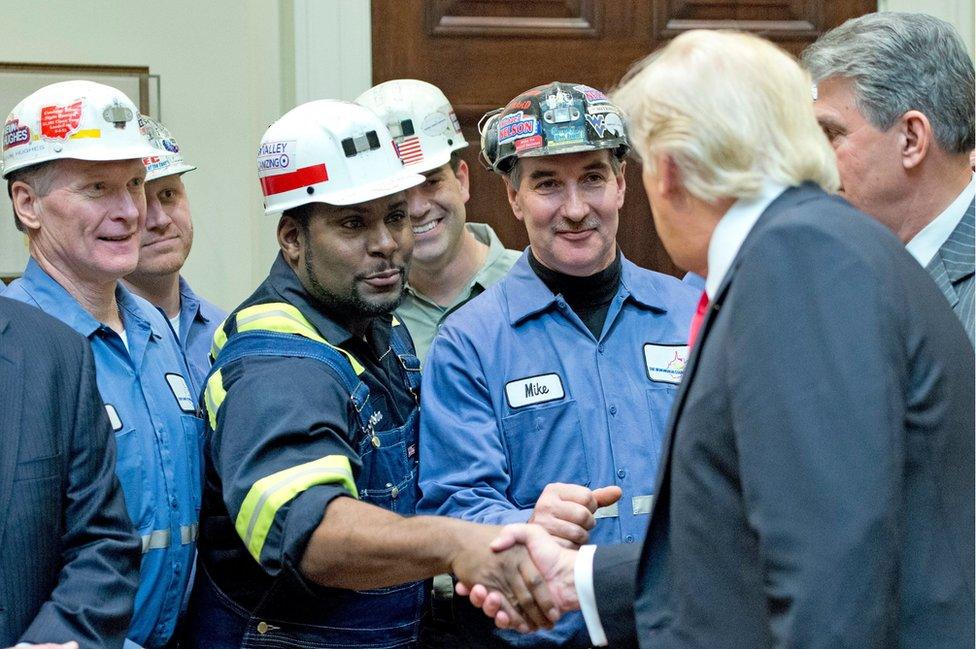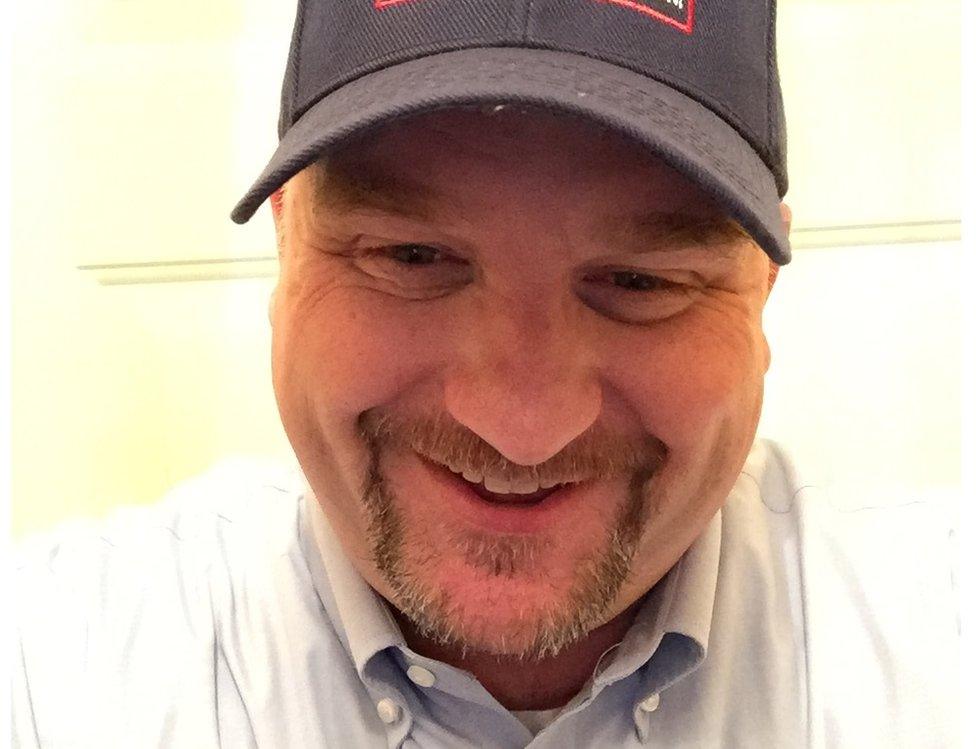Why Republicans' support for Donald Trump is sky-high
- Published

Mr Trump was chosen as the Republican nominee for president after a fierce and often bitter battle with opponents
He's fallen out with judges, journalists and intelligence agents, and his approval rate is a measly 41%, external among all adults in the US.
But there's one group of people with whom President Donald Trump is still hugely popular.
After his first weeks in office, his approval rate among Republicans of 86% is second only to that of George W Bush among all of the party's presidents elected in the last 65 years.
So what are the things that they like so much?

'I'm going to make a lot of money' - the investor

Despite being a Republican, property developer John Delia says he was "too embarrassed" to vote for Mr Trump in November's election because of the controversy about his candidacy.
But he says he was "relieved" to see the New York billionaire win the race - and what has happened since has pleased him even more.
Mr Trump's platform of new jobs, American business and economic renewal has sent the US stock market to record highs. It is investors like Mr Delia who are feeling richer as a result.
"I invest in the stock market and I have succeeded in the short term," says the 26-year-old, based in Columbus, Ohio.
"Investors are definitely feeling more confident. They think Donald Trump is going to bring more jobs and infrastructure, and help us move forward."
From a business perspective, he says he is not fazed about allegations of improper ties to Russia, legal challenges to Mr Trump's travel ban, or complaints about racist rhetoric from the administration.
"Yes, he's a bigot but at least you are aware," says Mr Delia of the US president. "He speaks honestly.
"No matter what happens, most investors just want to make money. We are not going to pay attention to the drama. We're just trying to stay ahead of the curve."
And it is especially Mr Trump's promise to "clean up" America's inner cities that makes Mr Delia, who started his own property portfolio at 20, feel positive about the future. He hopes investment will pour into his own urban development projects.
"I think I'm going to make a lot of money," he says.

'I'll keep my job' - the coal miner

President Trump made revival of the coal industry a key campaign pledge
The next interviewee asked to remain anonymous, because he says the polarised political climate in the US has left him feeling "a bit paranoid".
"I often feel the country is being torn about and being a white/Christian/conservative makes you a hater and a racist," he says.
But in a social media conversation spanning several days, the 36-year-old coal miner from Indiana explained how Mr Trump's presidency was having a direct impact on his life.
Before the election, the father-of-four says he expected to lose his job in coal within five years, but with Mr Trump in office "it could be as many as 15".
He puts this down to the president's cancelling of an Obama-era environmental regulation known as the "stream protection rule". The bill put restrictions on coal companies wanting to expand and tried to stop them dumping mining waste into streams and waterways.
While environmentalists point out that the rise of cheap natural gas has contributed largely to decline in the US coal industry, the Indiana coal miner we spoke to says the policy put a "stranglehold on coal companies".
"During 2016 our company was in the process of getting permits to strip some land that would add life to the mine," he says.
"The permitting process was put on hold concerning a impact study on the land. Management told the miners that if we didn't get any new permits and most of them were on hold indefinitely, we would be out of work in a few years."
Now Mr Trump has lifted the rule, he feels "hopeful" that he will be able to continue the work done by his great-grandfathers for years to come.
"Some people really dislike the coal industry... but it's the best paying job around and I'm blessed to be able to work and support my family."

'More control over healthcare' - the retiree

Marilyn De Reggi was diagnosed with stage three colon cancer just a month before her late husband, Aime, had his first stroke.
The 76-year-old says her experience of having to "fight hard" for him - while being unwell herself - left her with a low estimation of government-subsidised healthcare.
She welcomes Mr Trump's efforts to repeal and replace Obamacare as "extremely important". And while she also supports Mr Trump's tough immigration policies, she sees his push of an alternative system as one of the best things he's done so far.
What's in the Republican healthcare bill?
The Affordable Care Act, known as Obamacare, helped 20m previously uninsured Americans get health insurance by making it a legal requirement.
However, increases in insurance premiums - which were also a problem before the health law - have irked many Americans. Critics have also decried it as an unwarranted intrusion into the affairs of private businesses and individuals.
Mrs De Reggi, a retired musician and teacher who lives just outside Washington DC in Maryland, says the cost of President Obama's signature healthcare plan has left younger members of her family struggling.
And although medical costs for her and her late husband were covered by Medicare (a different government-run programme available to elderly patients), this made her "very aware" of the problems with federal involvement.
"I encountered the worst of care with my husband and the limitations of government making decisions for you," she says.
The couple went through "a lot of savings" after Aime was denied access to certain sorts of care under Medicare because of his age and condition, she says. Instead they had to pay hundreds of thousands of dollars to secure the treatment they wanted.
She is now against "the government making medical choices". "I'm interested in a programme gives people a choice and where there aren't committees that decide what happens to you at a certain age," she adds.

'A conservative on the Supreme Court' - the lawyer

"I think the thing that [Mr Trump] has done so far that will have the greatest long term impact on the law is the nomination of Neil Gorsuch to the Supreme Court," says David Rogers, a housing lawyer from Texas.
"I think he brings predictability in the law. The law is not going to change dramatically and that is good."
The Supreme Court has the final legal word on many of the most sensitive US issues. Conservatives celebrated the selection of Judge Gorsuch to fill an empty seat on the bench because of his views on issues such as birth control and euthanasia.
But it is his approach to gun rights that particularly pleases Mr Rogers.
The 52-year-old says he expects the judge to protect the Second Amendment - which guarantees the rights of people to keep and bear arms - because he is known to maintain a strict interpretation of the US Constitution.
"I believe in guns," says Mr Rogers. "Going to the gun range is something I do at the weekend with my children... With Gorsuch, I feel like I don't need to worry that's going to be taken away."
Judge Gorsuch's appointment still needs to be confirmed by the Senate. But if it goes ahead, "Washington isn't going to actively make my life harder", says Mr Rogers.
"Gun rights feel safer under Trump."